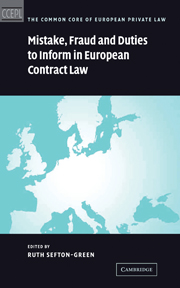Book contents
- Frontmatter
- Contents
- General editors' preface
- Preface
- List of contributors
- Table of legislation
- Table of cases
- List of abbreviations
- 1 General introduction
- 2 Mistake, misrepresentation and precontractual duties to inform: the civil law tradition
- 3 The rise and fall of mistake in the English law of contract
- 4 Case studies
- 5 Comparative conclusions
- Index
2 - Mistake, misrepresentation and precontractual duties to inform: the civil law tradition
Published online by Cambridge University Press: 06 August 2009
- Frontmatter
- Contents
- General editors' preface
- Preface
- List of contributors
- Table of legislation
- Table of cases
- List of abbreviations
- 1 General introduction
- 2 Mistake, misrepresentation and precontractual duties to inform: the civil law tradition
- 3 The rise and fall of mistake in the English law of contract
- 4 Case studies
- 5 Comparative conclusions
- Index
Summary
Introduction
When comparing the law on mistake in modern legal systems, it is not immediately obvious that their provisions, although very different in some respects, are in fact the same in nature. This also applies to precontractual duties to inform that today are discussed in different contexts. And yet both fields of law spring from the same source, namely Roman law and the Aristotelian-scholastic theory of contractual acts. Nevertheless, there exists a fundamental difference between these two fields: whereas the law on mistake has developed uniformly and without significant interruption, the so-called ‘precontractual duties to inform’ coalesced from very different starting points and even today, have still not been grasped in a systematic fashion but are discussed in completely different fields of law.
At least in the legal systems of continental Europe, the two legal institutions of mistake and precontractual duties to inform may, to a certain degree, be separated. A mistake made when concluding a contract enables the mistaken party to free himself from a given declaration of intent, a promise or a contract – provided certain conditions have been fulfilled. A breach of duties to inform, however, gives rise to either the annulment or amendment of a contract already concluded or imposes a duty to compensate incumbent on the party bound to inform. Despite this major difference, both aspects of law are also partly connected.
- Type
- Chapter
- Information
- Publisher: Cambridge University PressPrint publication year: 2005
- 2
- Cited by



